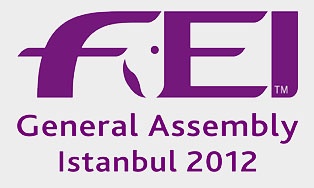
At the 2012 FEI General Assembly in Istanbul (TUR) the 13th edition of the FEI Veterinary Regulations effective 1 January 2013 was approved.
The new edition is a comprehensive rewrite, conducted on the basis of experience and wide feedback received on the use of the current format of the Regulations. The result is a more user friendly and concise regulatory document. It clearly explains the roles and responsibilities of all those involved in FEI events in a veterinary context. The veterinary concepts, principles and terminology in these Regulations will be incorporated in the FEI Discipline Rules. The harmonisation with the Discipline Rules will continue throughout 2013 and will be completed by the end of the year. By 2014 the Veterinary Regulations will become the document which contains all veterinary matters related to the FEI disciplines.
The main concepts and changes are summarised below.
FEI veterinarians and other treating professionals: the roles of the two new categories of FEI veterinarians - official and treating - are clearly outlined. This follows the suggestions of the Ljungqvist Commission to ensure better professionalism and consistency.
The term Veterinary Services Manager (VSM) has been introduced for the existing lead event treating veterinarian as appointed by the Organising Committee of an FEI event. The VSM will ensure that the facilities and the standard of veterinary services at all FEI events are upheld in accordance with the Veterinary Regulations. The significant difference between the roles of the FEI Veterinary Delegate (OV) and the VSM has been emphasised. The OV’s task is to officiate and provide feedback to the FEI on veterinary services and standards. The Veterinary Delegates cannot therefore be involved in the provision of veterinary services for an event.
Veterinary education: The veterinary roles at FEI events are now clearly split into two categories which are FEI Official Veterinarians (OVs) or Permitted Treating Veterinarians (PVs). The education requirements, qualification experiences and the new Codex for both PVs and OVs are described in detail. The entry level to both requires taking a short online examination. Both categories are issued with an FEI Veterinarian ID which must be presented at events.
A section dedicated to biosecurity has been added to the Veterinary Regulations underpinning the high degree of veterinary supervision at FEI events. In view of the increasing number of international equestrian events worldwide and also in order to facilitate the reduction of overly restrictive movement procedures, further government confidence is required in the FEI’s approach to protecting the health status of FEI horses. The new Regulations are intended to reduce the risk of infectious disease spread and to provide very simple management provisions for Organising Committees, their Veterinary Services Managers and Official Veterinarians in the case of a suspected, or actual, infectious disease situation during an event.
The new Veterinary Regulations also lay out more clearly the existing vaccinations requirements.
Limb sensitivity: following the experience gained and the feedback received during the consultation process, the Limb Sensitivity protocol been revised to include recording of all initial examinations as well as a clear re-examination procedure.
Veterinary Forms: The Equine Therapeutic Use Exemption Forms 1 and 2 and Medication Form 3, have been renamed Veterinary Forms 1, 2, and 3. The new Veterinary Form 4 introduces the opportunity for the self-declaration of substances according to the Equine Prohibited Substances List whereby a permitted treating veterinarian may self-authorise certain common support therapies for horses under their care. This form must be submitted to the Veterinary Delegate in advance of any treatments being given and is subject to stewards examinations.
The Medication Control Programme (MCP), which has traditionally only been associated with Regional Groups I and II, has been renamed Equine Anti-Doping and Controlled Medication Programme in view of the global roll out of prohibited substances testing.
The General Assembly was addressed by the Deputy Secretary General of the World Organisation for Animal Health (OIE) and former Chief Veterinary Officer of France, Dr Monique Eloit, who fully supported a closer working relationship between the FEI and the OIE.
Related Links
New Blood Rule Approved at 2012 FEI General Asssembly
Main Veterinary Decisions by FEI Bureau at 2012 FEI General Assembly